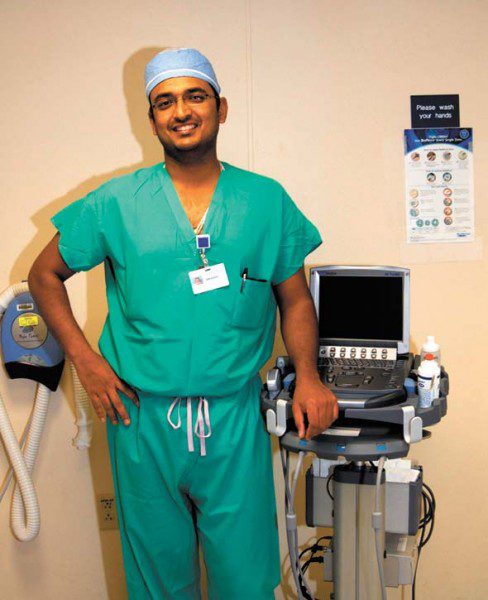

Ultrasound-guided nerve blocks enables patients to experience minimal to no pain after orthopaedic surgery. “Will I have pain after surgery, Doc?” is a common question most patients ask before having an operation. Post-surgical pain is often an unavoidable part of recovery — and managing the pain is one of the most common concerns for patients. That is, until recently. Mount Sinai Medical Center now offers ultrasound-guided nerve blockers to minimize and, in some cases, eliminate postoperative pain all together. While there are various modalities to manage pain, ultrasound-guided nerve block is one of the most exciting developments in the area of post-surgical pain management. The nerve blocks work by interrupting pain signals travelling from the area of surgery to the brain. Although nerve blocks are commonly used pain relievers, ultrasound-guided nerve blocking has only recently gained attention because it allows for site-specific targeted pain control.
Dr. Murlikrishna Kannan, Clinical Director of Regional Anesthesia at Mount Sinai, uses the ultrasound to guide the placement of a fine needle that deposits local anesthesia around the nerve. The anesthesia bathes the nerve and blocks it from transmitting painful sensations to the brain. The procedure is painless, safe, accurate and fast, taking as little as ten to fifteen minutes to complete. The nerve block results in little more than a “numb and sleepy leg,” as described by patients, and usually lasts for ten to twelve hours.
With the arrival of this new method for pain relief, orthopaedic patients at Mount Sinai are very comfortable after surgery and require less morphine during their hospital stay. Decreasing the dosage of morphine reduces a wide range of complications, including nausea, vomiting, constipation, drowsiness, low blood pressure, confusion and hallucinations. The pain relief also allows patients to ambulate, or walk, hours after total joint replacement, something that was impossible when severe pain was a factor after surgery, yet extremely important for the healing process.
Pain can cause a variety of other adverse effects, such as delaying postsurgical recovery and reducing the full benefit of the procedure. Excessive pain can also cause stress and anxiety, which can precipitate erratic blood pressure and even heart attacks. Pain also prevents patients from getting out of their bed. When patients stay in bed too long after surgery, they can develop pressure sores, lung infections and blood clots in the legs, a condition known as deep vein thrombosis. It is easy to understand why effective pain control after surgery has become very important.
With ultrasound-guided nerve blocks, patients enjoy faster recovery, and move on to rehabilitation in as little as two days after surgery. And, it gives patients the answer they want to hear about post-surgical pain: “Rest easy, you should experience little or no pain after this procedure.”
For more information on pain-free surgery, call 305-674-CARE (2273).
ABOUT DR. MURLIKRISHNA KANNAN:
Dr. Kannan has been an anesthesiologist for ten years and is a board certified anesthesiologist in India, England and the United States. He is currently involved in performing ultrasound-guided nerve blocks for patients undergoing orthopaedic and podiatry surgery. Dr Kannan is also instrumental in teaching other anesthesiologists how to perform ultrasound-guided nerve blocks.





